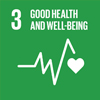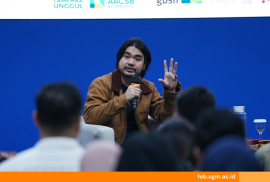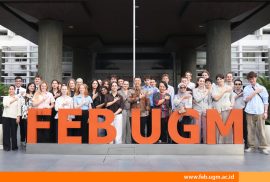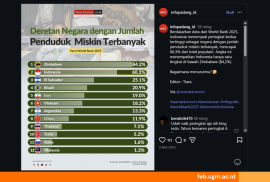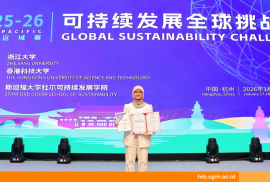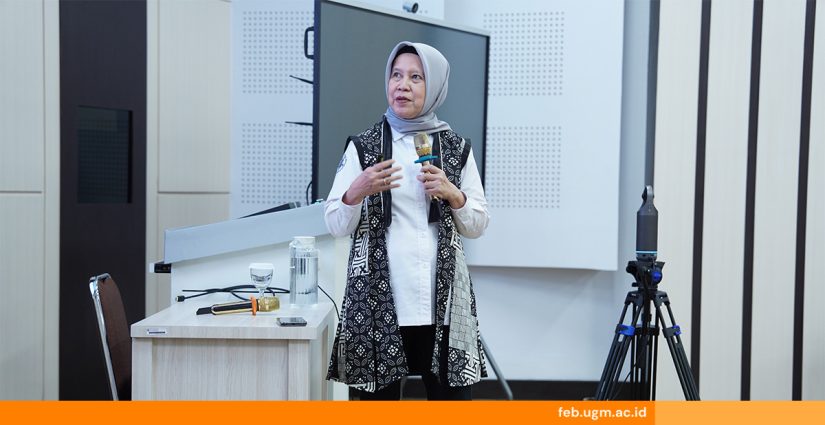
Indonesia is among the countries with the highest dengue fever mortality rates in Asia. The combination of a hot and humid tropical climate creates ideal conditions for the growth of Aedes aegypti mosquitoes, the primary vector of dengue fever. Recognizing this challenge, Professor Adi Utarini from the Faculty of Medicine, Public Health, and Nursing (FK-KMK) at Universitas Gadjah Mada (UGM) initiated research on the implementation of Wolbachia Aedes aegypti technology to control dengue cases in Indonesia.
She presented his research as a keynote speaker at the Societal Impact Symposium (SIS) 2025, which was held in a hybrid format at the FEB UGM Multimedia Room and via Zoom Meeting on Monday (22/9/2025). SIS was attended by 16 researchers from FEB UGM and two researchers from the University of Southampton. This event was organised as a platform to disseminate and encourage research that impacts society.
Aedes aegypti is the most common mosquito species found in Indonesia. Beyond being the primary carrier of dengue, it also spreads viruses such as Zika, Chikungunya, and yellow fever. Transmission occurs when a mosquito infected with the dengue virus bites a human. The spread of this mosquito has become even more extensive with climate change, as rising temperatures in Indonesia create optimal conditions for its reproduction.
Addressing the surge in dengue cases is far from simple. According to Adi, reducing the Aedes aegypti population in Indonesia is an enormous challenge. Thus, in 2011, she initiated her research on Wolbachia-infected mosquitoes, supported by funding and collaboration with the World Mosquito Program at Monash University, Australia, the Tahija Foundation, and Universitas Gadjah Mada.
Wolbachia is a type of bacteria commonly found in insects such as mosquitoes, butterflies, and flies, and is passed down through eggs to the next generation. It poses no risk to humans. However, Aedes aegypti in Indonesia naturally do not carry Wolbachia. Studies have shown that this bacterium can block the development of the dengue virus inside the mosquito’s body, reducing its ability to transmit the virus to humans.
The early phase of the research focused on safety and feasibility, ensuring that the Wolbachia mosquitoes introduced from Monash University were safe to release in Indonesia. The study then advanced to a pilot project in four neighborhoods in Yogyakarta, Nogotirto, Kronggahan, Jomblangan, and Singosaren. Adi explained that the biggest challenge during this phase was both technical and social, namely, convincing residents that releasing mosquitoes was intended to reduce dengue, not worsen the outbreak. The regulatory process was also lengthy, requiring approval from multiple stakeholders, including the government, universities, and local communities. To increase trust, the research team regularly held educational programs to foster trust and invited residents to visit their laboratories.
The mosquito release was carried out by placing small containers filled with water, Wolbachia mosquito eggs, and food around residents’ homes at 75–100 m² intervals. The process required strict monitoring and was conducted twice a week until at least 60% of the local mosquito population had been infected with Wolbachia. The idea was that once released, the Wolbachia mosquitoes would mate with local ones, passing the bacteria on to future generations. “Wolbachia suppresses dengue virus growth in the mosquito’s body, so when it bites humans, the risk of transmission is reduced,” Adi explained.
The project then progressed to a large-scale effectiveness trial using the Cluster Randomized Trial (CRT) method. The results were significant: within six months of the Wolbachia release in the four neighborhoods, dengue cases decreased by 77%, while hospitalizations dropped by 86%. “With these results, we felt more confident to move to the next stage,” she said.
This success positioned Wolbachia technology as one of the most promising public health interventions, an innovation that could deliver long-term impact in a relatively short period. In 2022, UGM, the government, and parliament began preparing for a national-scale trial. Then, a year later, Wolbachia mosquito releases occurred in eight chosen cities: Medan, Bandar Lampung, West Jakarta, Bekasi, Bandung, Semarang, Gianyar, and Kupang. However, Adi emphasized that at the national level, the primary responsibility lies with the Ministry of Health, while researchers act more as technology providers and health consultants.
Lastly, to ensure success nationwide, Adi emphasized the need for stronger policies and implementation, including updating the national dengue roadmap and enhancing multisectoral collaboration. A clear implementation model is also necessary to ensure that government and private sector involvement can coordinate to achieve optimal outcomes.
“Impactful research requires a long-term and multidisciplinary approach, trusted relationships with stakeholders across different levels, and effective communication strategies with the community,” she concluded.
Reportage: Najwah Ariella Puteri
Editor: Kurnia Ekaptiningrum
Sustainable Development Goals

